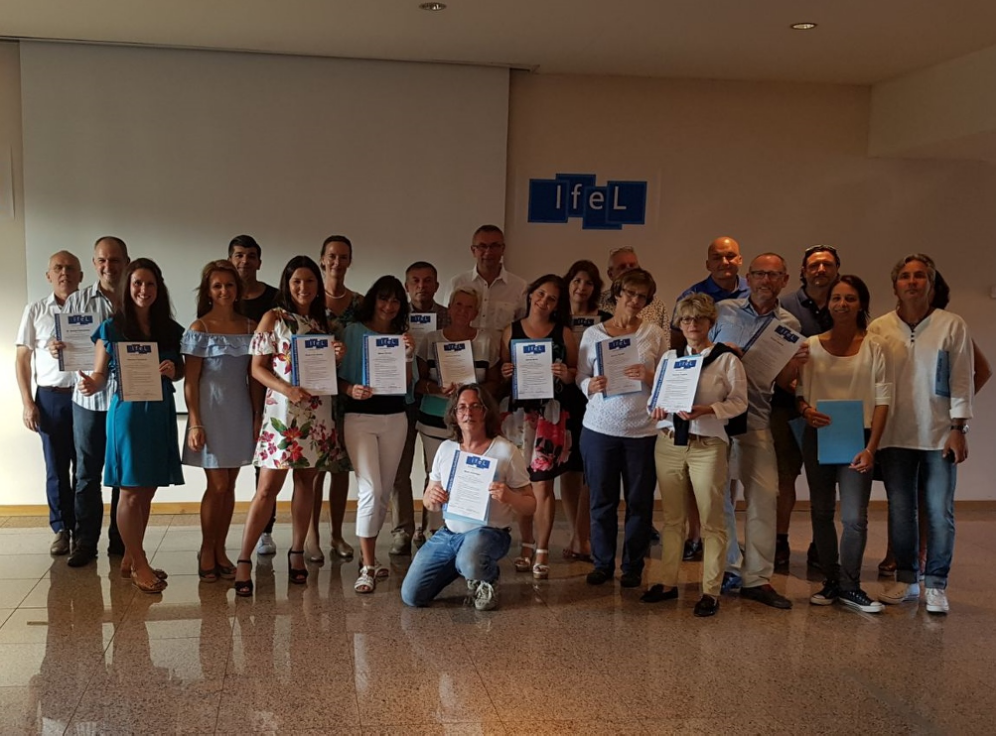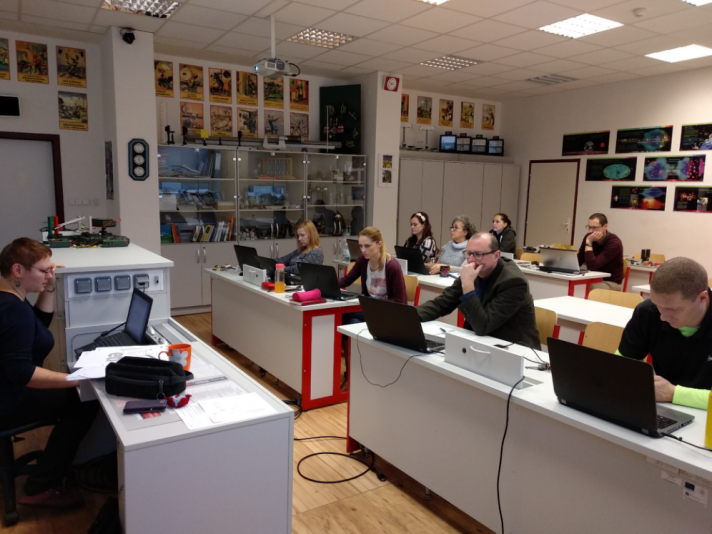
Topic(s) addressed
The project’s topics revolved around the teaching and learning of foreign languages; international cooperation and relations, cooperation in development; and, ICT (new technologies and digital skills), with its main goals being to increase the school's competencies in project management, and progressive methods in teaching foreign languages. The project’s aim was to enable students to expand their knowledge base and skills, and facilitate experience exchange in relation to the field of informatics, thus supporting constructive and creative thinking among participants. One of the project’s three educational activities focused on ICT skills, which was aimed at improving students’ skills in the use of technologies and ICT, and to present ways in which they may be connected to teaching methods, in the interest of demonstrating the potentials of interesting tools, software, and programmes in the development of students’ and teachers’ language skills.
Target groups
Although the project focused primarily on teacher education, its main impact was most visible among students, as they were the group that benefitted most from the knowledge and skills gained by participating teachers. As a result of this project, the educational process was greatly improved, with students being the recipients of quality education; moreover, the knowledge gained from this project was widely shared among the teaching staff. Lastly, interest from pedagogical staff with regard to mobility participation continued to grow since the project’s implementation, and they are continuously informed of new possibilities for participation in Erasmus+ projects.
Methodologies
A number of knowledge, skills, and attitudes were gained from this project, which, by ensuring a more active role among "learners" with regard to the teaching method, led to an improvement in the school’s overall teaching processes. Knowledge: information was obtained on the use of various technological tools such as freely available programmes for educational purposes, which led to a number of positive outcomes, including improved knowledge in the field of digital technologies and the creation of various online exercises; improved knowledge on assessment methods for acquired skills and competences in the context of formal and non-formal education; dissemination of knowledge on the use of different teaching methods in other countries; and, procurement of needed information on the use of various electronic platforms towards the acquisition of new foreign partners. Skills: skills acquisition led to a number of favourable outcomes with regard to the use of technological tools, including knowledge expansion in website/blog creation and editing; the application of various programmes in the development of new learning tools; the use of technological tools for teaching; introduction to new practical strategies for the integration of social media into intercultural project management; and, the development of criteria towards the success of intercultural and school exchange projects. Attitudes: the project contributed to the enrichment of teachers’ awareness and attitudes in relation to their vocation, including awareness-raising of new and creative online teaching methods (provided through workshops and presentations); improvement and diversification in the teaching of a number of subjects at schools through the introduction of new and innovative methods; a heightened sense of initiative and entrepreneurship; reinforcement in electronic international cooperation between schools in the field of education; motivation of teachers and learners to encourage education and cooperation; involvement of other teachers and students in international projects; and, the development of new contacts through various online platforms in the interest of expanding cooperation at both formal and informal levels.
Environments
One of the project’s aims was to apply acquired competencies to the school’s teaching and management processes, and to incorporate qualitative changes to both of the aforementioned processes. The project’s successful implementation, and its attainment of envisioned goals, was evident through a number of indicators, including teacher and student satisfaction, and students’ increased motivation to interact with other people and cultures; improved learning outcomes through innovations in teaching processes, ICT, and various teaching applications and websites; the development of language skills through newly applied electronic tools, activities on the eTwinning platform and the desire to understand different cultures; participation in international projects; and, the establishment of new partnerships (including in the online space). As a result, the school has had an active presence abroad, and this continues to be the case even today.
Teachers
New methods and forms of teaching were applied to the teaching of foreign languages, such as learning through the use of authentic audio recordings of students from foreign schools, authentic correspondence, students' work on the eTwinning platform, and the use of a number of new ICTs. In particular, the teaching of English included the use of newly-acquired vocabulary, which increased student interest in contemporary British events. Authentic materials that had been collected were particularly useful in the presentation of foreign cultures, monuments, and customs, with the foreign mobility experience providing a number of authentic online resources that were relevant to the information being presented – resulting in an improvement in teaching quality. Some of the course’s other components included the development of a blog and website; the use of various educational applications in the creation of tests, wiretaps, and videos; and, the use of technological tools for teaching. These experiences were presented to other teachers from the school, who actively adopted them into their respective teaching approaches. A project participant had also developed her own mathematics website and applied interactive online exercises for students using Learning Apps and EdPuzzle applications, among other tools; moreover, she developed a website for the KA2 project "Effective Education, Better Future," which she actively utilised to teach others. All project participants shared their acquired competencies with SGŽP teachers, as well as through presentations in SSOŠ’ metallurgical environment, with all of the project’s acquired knowledge, skills, and insights regarding online teaching presented in a key workshop. The acquisition of new contacts with foreign teachers proved to be of immense benefit, with a new international trilateral undertaking carried out with a German grammar school in Kaiserslautern, and a Polish lyceum in Sycow – a cooperation that saw student exchanges being carried out among all three institutions; furthermore, this cooperation resulted in the realisation of a new KA2 project: "Wald 3.0 - Unser Naturerbe." Cooperation with the German Grammar School Hohenstaufen also led to the development of the KA1 project entailing job-shadowing exercises in Slovakia, which facilitated an additional exchange of work experiences. Naturally, this exchange took place within the ICT environment, with the teacher involved in the job-shadowing exercise being an informatics specialist.
Impact
This project has resulted in a significant improvement of our technological and ICT skills, with the project having demonstrated possibilities and ways in which technology and ICT may be connected to education methods, including through the use of online tools, software, and programmes in the development of teachers’ and students’ language skills. Crucially, the project also expanded and fortified our project coordinator’s experience, and contributed significantly to the acquisition of new contacts and foreign partners for further formal and informal cooperation (both distance and mixed mode). In the years to come, we anticipate this project playing a critical role in the improvement of our ICT capabilities, and it has not only greatly benefitted both teachers and students, but also the school’s reputation. Due to the competencies we acquired in the field of ICT, our work with other KA2 projects has also been significantly facilitated, with ICT literacy having markedly improved among teachers and students. Some of the project’s outputs include quality videos, presentations, websites, graphic design products (posters, banners, newsletters), and a significant improvement across virtual platforms such as Instagram, Facebook, YouTube, and the school and project’s websites. Lastly, against the background of the COVID-19 pandemic, the project’s implementation has substantially benefitted both distance and mixed mode education by increasing students’ and teachers’ adaptability through project-derived knowledge and skills acquisition.
- Reference
- 2017-1-SK01-KA101-035139
- Project locations
- Slovakia
- Project category
- Secondary education
- Project year
- 2021
Stakeholders
Participants
Bell Educational Services Ltd
- Address
- United Kingdom
Executive Training Institute Ltd.
- Address
- Malta
Institut für europäische Lehrerfortbildung UG (haftungsbeschränkt)
- Address
- Germany

